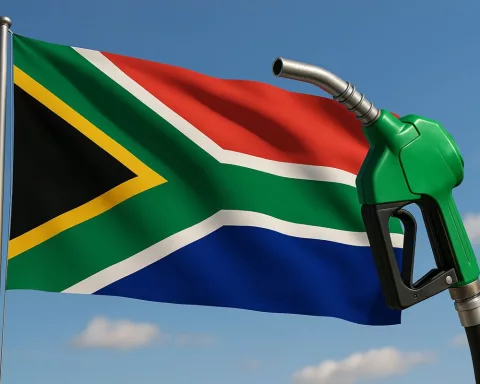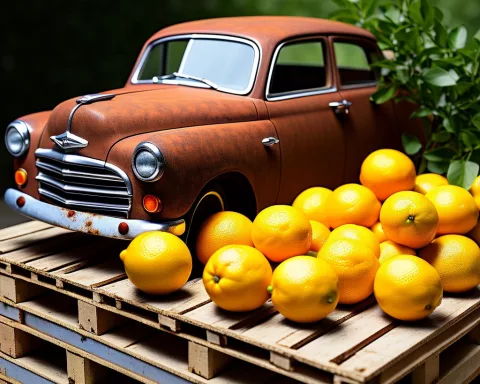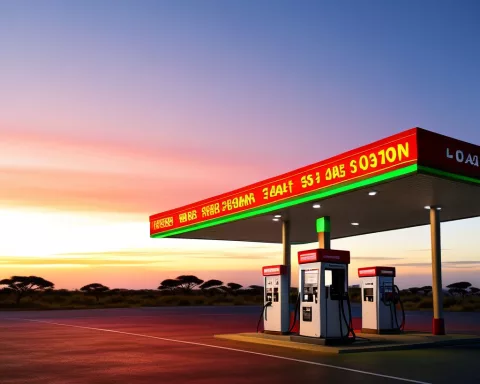Great news for South African drivers! Starting April 2, 2025, fuel prices are set to drop, bringing happiness to many. Petrol prices will go down by 58 cents for 93 octane and 72 cents for 95 octane, while diesel will drop by an impressive 86 cents per litre. This price cut means families can travel more easily, and it helps small businesses too, making life a bit easier for everyone. It’s a welcome boost that connects people and encourages more adventures across the beautiful landscapes of South Africa!
What are the new fuel prices in South Africa?
Starting April 2, 2025, 93 octane petrol will decrease by 58 cents per litre, while 95 octane petrol will drop by 72 cents per litre. Diesel prices will fall by up to 86 cents per litre, offering significant financial relief to South African motorists.
Welcome Relief for Drivers
South African motorists are in for a reprieve as the Department of Petroleum and Mineral Resources announced a significant reduction in fuel prices. Starting Wednesday, 2nd April 2025, this change brings much-anticipated financial relief to both city and countryside residents. Key factors driving this reduction include recent changes in global oil prices and a stronger local currency.
The new prices mark a substantial decrease: 93 octane petrol will reduce by 58 cents per litre, while 95 octane petrol will drop by 72 cents per litre. Diesel prices will experience an even more dramatic fall, with wholesale prices declining by up to 86 cents per litre. Additionally, the prices of illuminating paraffin and LPGAS will also decrease, easing the financial burden on numerous households.
This price drop results from an intricate interplay of both international and domestic influences. Global oil prices have slid from $74.89 to $71.04 per barrel, primarily due to increased supply from non-OPEC nations and anticipations of further production hikes by OPEC+ members. This surplus, combined with a stronger rand—up from R18.50/$ to R18.30/$—has created an ideal scenario for lower fuel costs.
Financial Implications and Adjustments
However, this positive news comes with a few caveats. The March Budget Speech introduced tax adjustments that will slightly affect fuel levies. The carbon fuel levy will rise by 3 cents per litre, bringing the total levies to 399 cents per litre for petrol and 387 cents per litre for diesel. Fortunately, the Road Accident Fund Levy and the general fuel levy will remain unchanged.
Revised transport tariffs for road and pipeline deliveries are also set to take effect. These regional adjustments will impact specific pricing zones differently, with increases ranging from 7.5 cents per litre in some areas to a more modest 2.3 cents per litre in others. This ensures that the reduction in fuel prices is uniformly beneficial, though the extent of relief may vary by region.
In the weeks leading up to this announcement, projections from South Africa’s Central Energy Fund indicated the possibility of even larger cuts. Their data suggested that petrol 93 could drop by 74 cents per litre and petrol 95 by 88 cents per litre. Diesel was projected to fall by 94 cents per litre for 0.05% sulphur content and 96 cents per litre for 0.005% sulphur content. Although the actual reductions did not fully meet these projections, the confirmed price adjustments still represent a significant easing of costs for South Africans.
Cultural and Historical Significance
The reduction in fuel prices is more than just an economic adjustment; it carries cultural and historical significance. For many South Africans, cheaper fuel translates into increased mobility, which is crucial for economic participation and social integration. The diverse landscapes of South Africa, from the bustling streets of Johannesburg to the serene vineyards of Stellenbosch, become more accessible. Lower fuel costs mean that families can visit heritage sites like the Cradle of Humankind or Robben Island with greater ease.
Historically, fuel prices have been a barometer of economic health and political stability. The oil crises of the 1970s are a stark reminder of how fluctuating fuel prices can impact not just economies but also the everyday lives of individuals. During that era, long lines at petrol stations and the high cost of fuel led to a ripple effect across various sectors. While modern economies are more resilient today, the importance of affordable fuel remains undiminished.
From an artistic perspective, the role of fuel in shaping modern life is akin to the influence of the Industrial Revolution on 19th-century art and literature. Just as the advent of machinery and steam power inspired a generation of artists and writers, affordable fuel can open new horizons for creative expression. Imagine a filmmaker capturing the stark beauty of the Karoo or a writer drawing inspiration from a road trip along the Garden Route. Cheaper fuel democratizes these experiences, making them accessible to a broader audience.
Social and Economic Impact
Lower fuel costs also have significant implications for social justice. Reduced prices can alleviate some of the economic pressures faced by poorer households, fostering a more equitable society. In regions where public transport options are limited, the ability to afford petrol can significantly impact a family’s quality of life. Access to schools, healthcare facilities, and employment opportunities becomes easier, contributing to a more inclusive social fabric.
The broader economic implications are equally noteworthy. Small and medium enterprises (SMEs), often described as the backbone of the economy, stand to benefit from reduced operational costs. Delivery services, agricultural businesses, and logistics companies will find their cost structures more manageable, allowing for potential reinvestment and growth. This, in turn, can stimulate job creation and foster economic resilience.
South Africa’s unique geographical and cultural landscape makes the impact of fuel prices particularly pronounced. The country’s vast distances and varied topography necessitate significant fuel consumption, whether for farming in the Free State or tourism in Mpumalanga. Therefore, the reduction in fuel prices is not just a financial relief but a facilitator of national cohesion and development.
Environmental Considerations
In a world increasingly conscious of environmental impact, the role of fuel remains a double-edged sword. While the immediate relief brought about by lower prices is welcomed, it also serves as a reminder of the ongoing reliance on fossil fuels. The challenge moving forward is to balance economic benefits with sustainable practices, ensuring that future generations inherit a world that is both prosperous and environmentally sound.
As South Africans prepare to benefit from these price reductions, the broader context serves as a poignant reminder of the intricate web of factors influencing fuel prices. It is a dance between global market dynamics, domestic economic policies, and the everyday lives of individuals. While the immediate benefits are clear, the long-term implications offer fertile ground for further reflection and action.
“`markdown
FAQ: Fuel Prices Drop in South Africa
What are the new fuel prices in South Africa starting April 2, 2025?
Starting April 2, 2025, 93 octane petrol will decrease by 58 cents per litre, while 95 octane petrol will drop by 72 cents per litre. Diesel prices will fall by up to 86 cents per litre.
What factors contributed to the decrease in fuel prices?
The significant reduction in fuel prices is attributed to recent changes in global oil prices, which have decreased from $74.89 to $71.04 per barrel, along with a stronger local currency. Increased supply from non-OPEC nations and anticipated production hikes by OPEC+ members have also played a role.
Will there be any changes to fuel levies or taxes?
Yes, the March Budget Speech introduced a tax adjustment where the carbon fuel levy will rise by 3 cents per litre, bringing the total levies to 399 cents per litre for petrol and 387 cents per litre for diesel. However, the Road Accident Fund Levy and the general fuel levy will remain unchanged.
How will the price drop affect small businesses and families?
The reduction in fuel prices is expected to provide substantial financial relief for families, making travel more affordable. Small and medium enterprises (SMEs) will also benefit from reduced operational costs, which can lead to reinvestment, growth, and potential job creation.
What are the broader social and economic implications of the price drop?
Lower fuel costs can relieve some economic pressures faced by poorer households, facilitating easier access to schools, healthcare, and job opportunities. This can contribute to social equity and cohesion. Furthermore, small businesses will find it easier to manage operational costs, which can stimulate economic resilience in the region.
Are there any environmental considerations related to the decrease in fuel prices?
While the price drop is a welcome relief, it highlights the ongoing reliance on fossil fuels. Moving forward, it is important to balance economic benefits with sustainable practices to ensure a prosperous and environmentally sound future for generations to come.
“`












